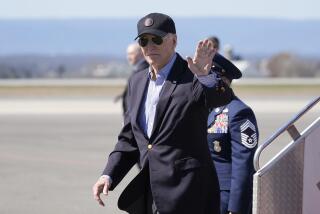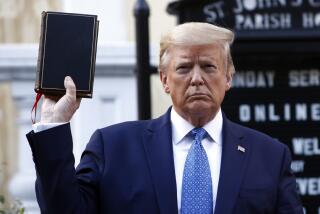Letters: Obama’s puzzling prayer position
- Share via
Re “Bowing to religion,” Opinion, Nov. 5
The only elected official in America who represents all the people is the president. As such, I could not agree more with Erwin Chemerinsky’s question as to why President Obama has committed the people of the United States to advocate for the allowance of prayers that are explicitly sectarian at public meetings.
The government’s position, as set forth in its brief to the Supreme Court, argues that the mention of a specific belief or deity does not promote it. Tell that to the person of a different faith or a nonbeliever who is at the meeting. The allowance of prayers to Jesus Christ before a governmental entity representing Jews, non-believers and Muslims should not be the price of civic participation in America.
As a city attorney for 32 years, I observed that a general nondenominational prayer worked well and was more American in spirit than what the Obama administration advocates.
Michael H. Miller
Los Angeles
The separation of church and state does not mean that one ignores the other.
The richness of American religious plurality is not honored by reducing everything to its least common denominator. By doing so, we are introducing a new state-sponsored religion, where every American is coerced into a monochromatic public expression of belief or nonbelief.
Invoking a deity (or nondeity) at a public meeting is not only healthy but necessary. To call upon Adonai, Jesus, Allah, Krishna or others, or to read a poem or have a moment of silence, brings to awareness the multi-religious profile of the community that governing body is called to serve.
The Rev. Vivian Ben Lima
Woodland Hills
Prayers are fine when said privately (as the Judeo-Christian Bible dictates, by the way) or publicly in church. They have no place at public functions.
Personally, I’d like to hear our elected leaders begin meetings by reciting this pledge:
“We promise to uphold local, state and national laws, behave with dignity and professionalism at all times, work for the common good, accept no gifts, and do our job without any expectation of personal gain.”
How refreshing that would be.
Bonnie Sloane
Los Angeles
Would you be offended if someone said a prayer for you? Would you be offended if someone asked God to help you find success in life? Is it prayer that excludes and marginalizes, or is it the individual seeking to exclude prayer from the public meeting place who excludes and marginalizes?
If a Buddhist monk or a Native American opened a public meeting with a prayer, would you be offended? Have we become so intolerant of one another that we cannot listen to or ignore a two-minute prayer?
Our rights are God-given, as our Declaration of Independence acknowledges. Some believe that opening a public meeting with a prayer somehow forces one to take part in religious devotions. Is anybody really forcing others to do anything other than be more tolerant?
Nathan Post
Santa Barbara
Irrespective of the thorny legal questions, the religious irony of invoking Jesus at government meetings by Christians is breathtaking.
In the Sermon on the Mount, Jesus was very clear that one’s prayers were not to be practiced in public; rather, one must enter one’s own closet and pray in secret. He specifically warned that only the hypocrites pray in synagogues (the synagogues were not only places of worship but also the local town halls).
Jesus considered public prayers at these assemblies as political posturing and soundly condemned them.
Thus, Christians who, in opposition to the teachings of Jesus, pray at public meetings actually dishonor the very name they invoke.
The Rev. Douglas Miller
Santa Barbara
ALSO:
Letters: Hunger before politics
Letters: Toy guns shouldn’t be toys
Letters: The NSA’s ‘haystack’ of data
Letters: Hunger before politics
Letters: Toy guns shouldn’t be toys
Letters: The NSA’s ‘haystack’ of data
More to Read
A cure for the common opinion
Get thought-provoking perspectives with our weekly newsletter.
You may occasionally receive promotional content from the Los Angeles Times.










